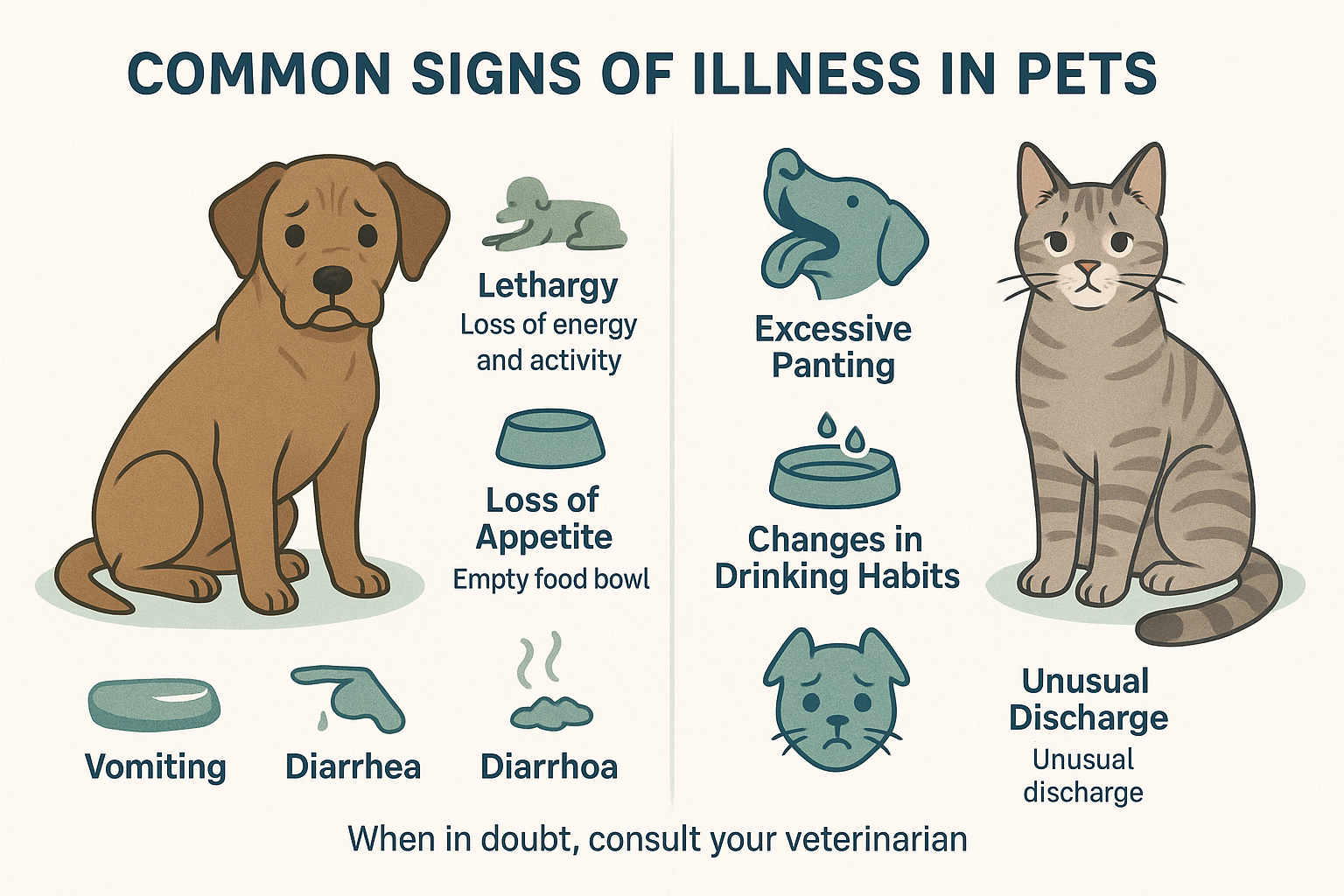Why Illness in Your Pet Shouldn’t Be Ignored
Many pet owners underestimate how quickly illness in a pet can escalate. A mild cough, skipped meal, or sudden lethargy may seem minor, but they often indicate underlying problems. By recognizing signs of illness early, you can prevent severe health complications and ensure a better quality of life for your pet.
General Signs of Illness in Your Pet
Changes in Eating and Drinking Habits
Illness in your pet often begins with noticeable appetite shifts. Excessive drinking could indicate diabetes or kidney illness, while refusal to eat may signal infections, digestive illness, or dental disease. Track changes closely, as even short-term appetite loss can be significant.
Weight Fluctuations
Sudden weight loss may be tied to thyroid illness, parasites, or cancer. On the other hand, rapid weight gain could point to hormonal imbalances or unhealthy diet-related illness. Monitoring your pet’s weight weekly helps detect illness before it becomes severe.
Behavioral Shifts
Illness in your pet frequently reveals itself in behavior. A dog that withdraws, or a cat that hides excessively, may be coping with pain or internal illness. Other behaviors—such as aggression, confusion, or clinginess—are also warning signs.
Unusual Odors
Strong or foul odors coming from your pet’s mouth, ears, or skin may indicate bacterial or fungal illness. Persistent bad breath can also suggest dental illness or organ failure, while ear odor often signals an infection.
Specific Illness Symptoms by System
Digestive System Illness
-
Vomiting and diarrhea that persist beyond 24 hours can indicate intestinal illness or poisoning.
-
Constipation may suggest digestive illness linked to dehydration or blockage.
-
Blood in stool is always a sign of serious illness requiring immediate veterinary attention.
Respiratory Illness
-
Coughing, wheezing, or heavy breathing may indicate respiratory illness such as pneumonia, bronchitis, or heart-related illness.
-
Nasal discharge that is thick, colored, or ongoing can also signal respiratory illness.
Skin and Coat Illness
-
Bald patches, sores, or excessive scratching often mean allergic illness, parasite infestations, or fungal infection.
-
Lumps under the skin should never be ignored—illness such as tumors or cysts may be present.
Urinary and Reproductive Illness
-
Frequent urination or difficulty passing urine can mean urinary tract illness or bladder stones.
-
Blood in urine is always a critical illness symptom.
-
In unspayed females, uterine illness such as pyometra can be life-threatening.
Neurological Illness
-
Seizures, tremors, or disorientation are neurological illness indicators.
-
Head tilts, balance loss, or sudden blindness suggest central nervous system illness requiring urgent care.
When Illness in Your Pet Requires a Veterinarian
Not all signs of illness require emergency visits, but some do. Contact a veterinarian immediately if your pet shows:
-
Difficulty breathing (respiratory illness)
-
Severe vomiting or bloody diarrhea (digestive illness)
-
Seizures or collapse (neurological illness)
-
Uncontrolled bleeding or trauma-related illness
-
Extreme lethargy that persists longer than 24 hours
For any illness symptoms lasting more than 48 hours, a vet checkup is recommended.
Prevention: Reducing Illness Risk in Pets
Preventing illness in your pet is as important as recognizing it. Proactive care reduces risks and improves overall well-being:
-
Regular Veterinary Exams: Detect illness early with annual or semi-annual checkups.
-
Vaccinations: Prevent contagious illness such as parvovirus, rabies, and feline leukemia.
-
Nutrition: A balanced diet tailored to breed and age helps prevent obesity-related illness.
-
Dental Care: Regular brushing or professional cleaning reduces oral illness risks.
-
Parasite Control: Prevent fleas, ticks, and worms, which transmit illness to pets.
-
Exercise & Mental Stimulation: Keeps your pet’s immune system strong and illness-resistant.
Frequently Asked Questions About Illness in Pets
Q1: What are the first signs of illness in a dog?
Common early illness signs include loss of appetite, lethargy, vomiting, and coughing.
Q2: How do cats show illness differently from dogs?
Cats often hide illness symptoms. Look for reduced grooming, hiding behavior, and litter box changes.
Q3: Can stress cause illness in pets?
Yes. Stress lowers immunity, making pets vulnerable to illness like infections or digestive problems.
Q4: How can I monitor illness symptoms at home?
Track eating, drinking, urination, defecation, and activity daily. Consistent changes suggest illness.
Q5: When should I seek emergency care for illness in my pet?
If your pet has difficulty breathing, severe vomiting, seizures, or cannot stand, seek emergency veterinary care.
Conclusion
Illness in your pet may start small, but early recognition is the key to saving lives. By observing appetite, weight, behavior, and specific system-related illness symptoms, you can act before problems become severe.
